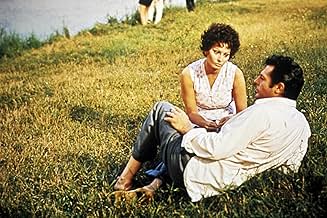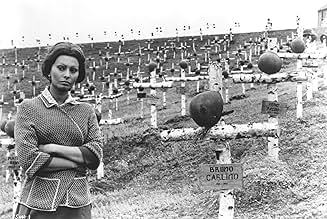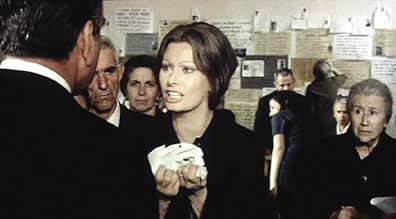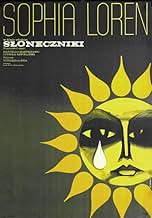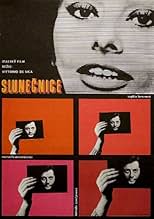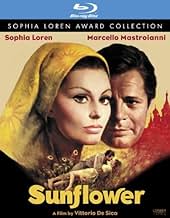PUNTUACIÓN EN IMDb
7,3/10
4,9 mil
TU PUNTUACIÓN
Una mujer italiana busca desesperada a su esposo, un soldado considerado desaparecido en acción en Rusia durante la Segunda Guerra Mundial.Una mujer italiana busca desesperada a su esposo, un soldado considerado desaparecido en acción en Rusia durante la Segunda Guerra Mundial.Una mujer italiana busca desesperada a su esposo, un soldado considerado desaparecido en acción en Rusia durante la Segunda Guerra Mundial.
- Dirección
- Guión
- Reparto principal
- Nominado para 1 premio Óscar
- 1 premio y 2 nominaciones en total
Lyudmila Saveleva
- Mascia
- (as Ljudmila Saveljeva)
Nadya Serednichenko
- Contadina russa
- (as Nadja Cerednicenko)
Gunars Cilinskis
- Funzionario russo
- (as Gunnar Zilinskij)
Carlo Ponti Jr.
- Giovanna's Baby
- (sin acreditar)
Mariya Sapozhnikova
- Passerby
- (sin acreditar)
Reseñas destacadas
Vittorio de Sica achieved a remarkable feat in this eye-catching 1970 production, bringing together Americans and Soviets, in the midst of the Cold War, in the co-production of a Franco-Italian film.
From the Americans he got a memorable soundtrack, written and directed by Henry Mancini and nominated for an Oscar. From the Soviets he received the footage from Mosfilm, directed by Andrey Konchalovskiy, as well as the actress Ludmila Saveleva.
The script by Tonino Guerra and Cesare Zavattini has everything it needs to work, but the film gets lost somewhere in between so many attributes.
The story is basic and excessively melodramatic. The soundtrack is beautiful but quickly becomes cloying. The footage of the sunflower fields and the cemeteries of Russian combatants is powerful and eloquent, but inconsequential. This is, after all, a story of the living, not the dead. Only the final notes of the fatalism of war, which determines people's fates, far beyond their individual will, remain to give the film any meaning.
But it is not enough. A final result clearly less than the sum of its parts.
From the Americans he got a memorable soundtrack, written and directed by Henry Mancini and nominated for an Oscar. From the Soviets he received the footage from Mosfilm, directed by Andrey Konchalovskiy, as well as the actress Ludmila Saveleva.
The script by Tonino Guerra and Cesare Zavattini has everything it needs to work, but the film gets lost somewhere in between so many attributes.
The story is basic and excessively melodramatic. The soundtrack is beautiful but quickly becomes cloying. The footage of the sunflower fields and the cemeteries of Russian combatants is powerful and eloquent, but inconsequential. This is, after all, a story of the living, not the dead. Only the final notes of the fatalism of war, which determines people's fates, far beyond their individual will, remain to give the film any meaning.
But it is not enough. A final result clearly less than the sum of its parts.
I suppose this film is just a maudlin melodrama, so is the music by Mancini. But then..., what a marvelous maudlin melodrama!... Why shouldn't it be? what's wrong with maudlin melodramas? If they are well done and authentic with their characters, if we get wrapped up with their emotions..., well, can you ask for anything more?
I just saw this movie on "You Tube" for the second time. I remember seen it on late TV in Italy, many years ago, and the impression was so powerful that after somebody mentioned it a few days ago --I didn't remember any more this title until they mentioned it-- I decided to look for it and watch it again, to see after so many years if the impression was still the same (so many films are a total disappointment when seen for a second time years later), but it wasn't the case with this one.
The story is so poignant that it can hold on its own very well no matter the change in mores and film technical improvements, it definitely grabs your interest till the very end (I must admit the film is far from perfect, since, for example, there are no indications of how many years went by or the new life style Sophia's character turns to after her Russian trip.
It also has two climaxes, both marvelous, but I think they should have decided for one or the other, two climaxes is too much within the same movie, and the length should have been shortened quite a bit.
Anyhow, forget about the lachrymose side of the story and submerge yourself in it (also get some Kleenex handy because everybody will need them, and plenty) and if you have to have a good cry, well, have it and enjoy it!! (After all is just a movie).
I just saw this movie on "You Tube" for the second time. I remember seen it on late TV in Italy, many years ago, and the impression was so powerful that after somebody mentioned it a few days ago --I didn't remember any more this title until they mentioned it-- I decided to look for it and watch it again, to see after so many years if the impression was still the same (so many films are a total disappointment when seen for a second time years later), but it wasn't the case with this one.
The story is so poignant that it can hold on its own very well no matter the change in mores and film technical improvements, it definitely grabs your interest till the very end (I must admit the film is far from perfect, since, for example, there are no indications of how many years went by or the new life style Sophia's character turns to after her Russian trip.
It also has two climaxes, both marvelous, but I think they should have decided for one or the other, two climaxes is too much within the same movie, and the length should have been shortened quite a bit.
Anyhow, forget about the lachrymose side of the story and submerge yourself in it (also get some Kleenex handy because everybody will need them, and plenty) and if you have to have a good cry, well, have it and enjoy it!! (After all is just a movie).
In Naples, in World War II, the local Giovanna (Sophia Loren) has a torrid love affair with the soldier Antonio (Marcello Mastroianni), who is ready to embark to Africa. Giovanna proposes him to get married with her to get a leave of twelve days; then Antonio pretends that he is insane and he is sent to an asylum. However, the doctors discover the farce and they give the option to Antonio to go to the Russian front as volunteer instead of being sued. When Antonio is missing in action in Russia, Giovanna does not accept that he is dead. Years after the end of the war, Giovanna travels to Russia with a picture of Antonio to seek him out in the countryside. When she finds a lead in a village, her hope becomes disappointment with truth about his disappearance.
"I Girasoli" is one of the most famous romances of cinema and discloses a beautiful story of love, hope, truth and renounce. Vittorio De Sica explores the chemistry between Sophia Loren and Marcello Mastroianni to the best, supported by a magnificent cinematography and the wonderful soundtrack of Henry Mancini, which certainly is among the most beautiful ones of the cinema history. The screenplay uses much ellipsis, and my remarks are the lack of dates, leaving the viewer without any reference of how many years have passed; further, the dialogs in Russian that are not translated. My vote is eight.
Title (Brazil): "Os Girassóis da Rússia" ("The Russia's Sunflowers")
"I Girasoli" is one of the most famous romances of cinema and discloses a beautiful story of love, hope, truth and renounce. Vittorio De Sica explores the chemistry between Sophia Loren and Marcello Mastroianni to the best, supported by a magnificent cinematography and the wonderful soundtrack of Henry Mancini, which certainly is among the most beautiful ones of the cinema history. The screenplay uses much ellipsis, and my remarks are the lack of dates, leaving the viewer without any reference of how many years have passed; further, the dialogs in Russian that are not translated. My vote is eight.
Title (Brazil): "Os Girassóis da Rússia" ("The Russia's Sunflowers")
Epic romantic melodrama , set at the end of World War II , dealing with an Italian woman , Giovanna, she is a bereft war bride living near Milan , she conducts a desperate search for her husband, a soldier considered missing in action in Russia during WWII. As her husband never returned after serving on the Russian front . As Giovanna wandering over what feels like the whole of Russia and looking for clues her hubby. A woman born for love. A man born to love her. A timeless moment in a world gone mad. In a world gone mad...a love story. Filmed in Russia from the Kremlin to the Ukraine. A love story that spans two tempestuous decades in a motion picture of extraordinary power and enchantment!
Excruciating drama in which Sophia Loren plays a headstrong Italian wife looking for hubby , going to Russia to find him, starting in the town near the winter battle when he disappeared and much picturesque and soul-searching later she finds him with unexpected consequences . It is a heart-rending and heart-breaking studio of a beloved couple sadly separated by an unfortunate fate . There's a flashback to their brief courtship near her hometown of Naples, his 12-day leave to marry her, and ruses to keep from deploymentby posing as a nutty man . Sofia Loren gives a nice acting as the obstinate woman who refuses to accept that her husband missing on the Russian front, is dead. While Marcello mastroianni is perfect as the amnesic man missing in battle . The Technicolor cinematography by Giuseppe Rotunno and David Vinitsi is truly gorgeous. Shot on location in Russia and infact , this film is deemed to be the first occidental film to be shot in Poltava, Ukraine .And positively soaked in one of Henri Mancini's lushest soudtracks.
The motion picture produced by Carlo Ponti and Joseph H Levine , was stunningly directed by Vittorio de Sica . De Sica told about Loren : ¨I consider Sophia a great , a good actress and a great personality. Because she is a Neopolitan. Like me. We are the same people, the same origin. And we feel together the same. Yes, for me, I am very happy when I work with Sophia¨. De Sica was a famous actor and director .He turned to filmmaking in 1940 , making light comedies. His fifth movie collaborated with writer Cesare Zavattini , I Bambi ni ci guardano ,in which showed great sensitivity and nice fIl making . It was also the first movie he made with writer Zavattini with whom he would subsequently shoot "Shoeshine" , and Bicycle thief .After the boxoffice disaster "Umberto D" , he abandoned the Neorrealist genre to make more commercial films than previous . Subsequently , he he made "Yesterday , Today and Tomorrow" with Marcelo Mastroiani and Sofia Loren in which he won another Oscar . His two final films were Garden of Finzi Contini and A brief vacation that had limited success .Rating 7/10 . Worthwhile watching . Above average . Essential and indispensable seeing for Italian films buffs .
Excruciating drama in which Sophia Loren plays a headstrong Italian wife looking for hubby , going to Russia to find him, starting in the town near the winter battle when he disappeared and much picturesque and soul-searching later she finds him with unexpected consequences . It is a heart-rending and heart-breaking studio of a beloved couple sadly separated by an unfortunate fate . There's a flashback to their brief courtship near her hometown of Naples, his 12-day leave to marry her, and ruses to keep from deploymentby posing as a nutty man . Sofia Loren gives a nice acting as the obstinate woman who refuses to accept that her husband missing on the Russian front, is dead. While Marcello mastroianni is perfect as the amnesic man missing in battle . The Technicolor cinematography by Giuseppe Rotunno and David Vinitsi is truly gorgeous. Shot on location in Russia and infact , this film is deemed to be the first occidental film to be shot in Poltava, Ukraine .And positively soaked in one of Henri Mancini's lushest soudtracks.
The motion picture produced by Carlo Ponti and Joseph H Levine , was stunningly directed by Vittorio de Sica . De Sica told about Loren : ¨I consider Sophia a great , a good actress and a great personality. Because she is a Neopolitan. Like me. We are the same people, the same origin. And we feel together the same. Yes, for me, I am very happy when I work with Sophia¨. De Sica was a famous actor and director .He turned to filmmaking in 1940 , making light comedies. His fifth movie collaborated with writer Cesare Zavattini , I Bambi ni ci guardano ,in which showed great sensitivity and nice fIl making . It was also the first movie he made with writer Zavattini with whom he would subsequently shoot "Shoeshine" , and Bicycle thief .After the boxoffice disaster "Umberto D" , he abandoned the Neorrealist genre to make more commercial films than previous . Subsequently , he he made "Yesterday , Today and Tomorrow" with Marcelo Mastroiani and Sofia Loren in which he won another Oscar . His two final films were Garden of Finzi Contini and A brief vacation that had limited success .Rating 7/10 . Worthwhile watching . Above average . Essential and indispensable seeing for Italian films buffs .
As another reviewer pointed out this bit of cold war propaganda (pro Soviet) was absurdly impossible. An axis soldier would have been shot period or arrested as a spy and killed slowly in a prison camp.
So you have to dismiss the story as absurd as it stands and place it in Iran or Finland or some place where it could have happened. Or just suspend your disbelief.
Once you do that you can enjoy this bit of really well done maudlin romance. Loren had to be at the height of her classy beauty in this film (before she was aged for the story).
I loved the part where she spots an Italian man---the only handsome well dressed stylish man in any of the Russian scenes. Of course Loren herself is like a super nova star compared to the kerchiefed thick legged Russian women. Italian audiences must have loved this film.
I give it a 7 as it is very enjoyable once you deal with the absurd story and the maudlin nature of the movie. As another reviewer states what is so wrong with first class maudlin??
So you have to dismiss the story as absurd as it stands and place it in Iran or Finland or some place where it could have happened. Or just suspend your disbelief.
Once you do that you can enjoy this bit of really well done maudlin romance. Loren had to be at the height of her classy beauty in this film (before she was aged for the story).
I loved the part where she spots an Italian man---the only handsome well dressed stylish man in any of the Russian scenes. Of course Loren herself is like a super nova star compared to the kerchiefed thick legged Russian women. Italian audiences must have loved this film.
I give it a 7 as it is very enjoyable once you deal with the absurd story and the maudlin nature of the movie. As another reviewer states what is so wrong with first class maudlin??
¿Sabías que...?
- CuriosidadesThe child of Giovanna (Sophia Loren) in this film was actually Loren's from her partnership with producer Carlo Ponti.
- PifiasMascia tells Giovanna that when she found Antonio, he was hurt so badly that he had forgotten everything, including his own name. If that's true, then how did Mascia know his name was Antonio?
- ConexionesEdited into Marcello, una vita dolce (2006)
Selecciones populares
Inicia sesión para calificar y añadir a tu lista para recibir recomendaciones personalizadas
- How long is Sunflower?Con tecnología de Alexa
Detalles
- Fecha de lanzamiento
- Países de origen
- Idiomas
- Títulos en diferentes países
- Els gira-sols
- Localizaciones del rodaje
- Empresas productoras
- Ver más compañías en los créditos en IMDbPro
- Duración1 hora 47 minutos
- Mezcla de sonido
- Relación de aspecto
- 1.85 : 1
Contribuir a esta página
Sugerir un cambio o añadir el contenido que falta


